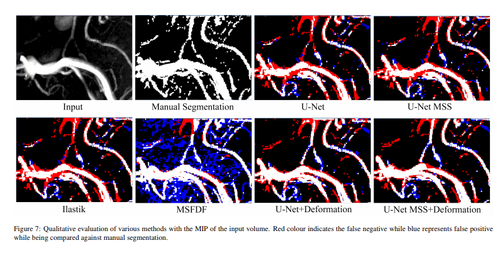NEWS
Invited Talk about Deep Learning Small Vessel Segmentation at Stanford University
With the advancement of 7 Tesla MRI systems, higher spatial image resolution can be achieved, enabling the depiction of very small vessels in the brain. Non-Deep Learning based approaches for vessel segmentation, e.g. Frangi’s vessel enhancement with subsequent thresholding are capable of segmenting medium to large vessels but often fail to segment small vessels. The sensitivity of these methods to small vessels can be increased by extensive parameter tuning or by manual corrections, although making them time-consuming, laborious, and not feasible for larger datasets. This paper proposes a deep learning architecture to automatically segment small vessels in 7 Tesla 3D Time-of-Flight (ToF) Magnetic Resonance Angiography (MRA) data. The algorithm was trained and evaluated on a small imperfect semi-automatically segmented dataset of only 11 subjects; using six for training, two for validation and three for testing. Deep learning model based on U-Net Multi-Scale Supervision was trained using the training subset and were made equivariant to elastic deformations in a self-supervised manner using deformation-aware learning to improve the generalisation performance. The proposed technique was evaluated quantitatively and qualitatively against the test set and achieved a dice score of 80.44±0.83. Furthermore, the result of the proposed method was compared against a selected manually segmented region (62.07 resultant dice) and has shown a considerable improvement (18.98%) with deformation-aware learning.
This research was conducted in collaboration with the Department of Radiology & Nuclear Medicine, Erasmus Medical Centre, Rotterdam, The Netherlands. The collaboration was with Florian Dubost and Gerda Bortsova, two PhD students at Erasmus MC, and their supervisor Prof. Marleen de Bruijne (who is affiliated with Erasmus MC, as well as with the Department of Computer Science, University of Copenhagen, Denmark). Further collaboration has now been planned with Florian Dubost, who is now a post-doc researcher at Stanford University.
Please get a deeper insight through the digital lecture by our MEMORIAL Graduate School member Soumick Chatterjee at Stanford University and the following publication (in review).
(März 2021)
